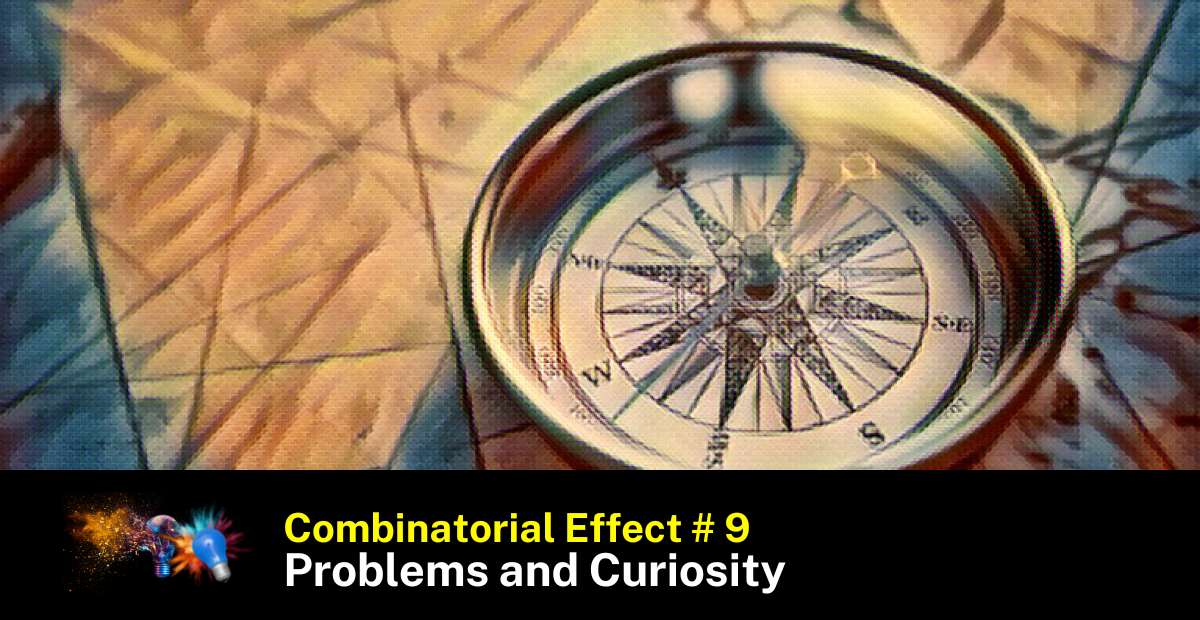Text in Spanish is available 🇪🇦
Combinatorial Effect is a newsletter to explore how can we connect things to build our projects.
Sometimes, the inspiration comes from the stories of people who have helped build unique businesses powered by technology. Sometimes it comes from our own experience.
Keep connecting the dots to ignite our innovative spirit.
________________________________________________________________
How do you feel when facing problems?
I want you to remember these feelings, to transform them into a positive force that will guide you to get outstanding results.
Typically, as human beings, we have seen problems as negative things.
But this vision ignores the problems´ potential to ignite our growth.
Problems usually have a big Combinatorial Effect,
and inspire Innovation.
Next time you will face a challenge,
I invite you to think about the problem differently…
Let me explain:
Our most common response to problems is complaining.
Instead of doing it,
let your curiosity takes over.
Then, your inner innovator has a chance to make magic,
by asking relevant questions about the problem,
looking for unique angles to tackle it,
connect with other people interested in solving the challenge,
and finally, you learn a lot about a new topic.
10 examples of inventors and their inventions.
- Uri Levine invented Waze to make traffic smoother,
- Larry Page and Sergey Brin invented Google to search for information easier on the internet,
- Delivery platforms were created to save us time,
- Mária Telkes invented solar energy solutuions after the II World War,
- Stephanie Kwolek discovered Kevlar to protect lives,
- Ayla Hutchinson, who invented the Kindling Cracker™ to cut wood safely,
- Bette Nesmith Graham invented Liquid Paper, to correct our typing mistakes when Ctrl-Z didn´t exist.
- Ella Gaillard who invented the eyeless needle still used in surgeries,
- Evelyn Berezin created the first known word processor,
- Hedy Lamarr, a famous actress who invented the frequency hopping systems, used in WiFi,
and a long list of etceteras.
- Bonus: Mary Anderson invented the windshield wipers.
Of course, all of them worked with teams to develop these ideas, but I want to emphasize their first reaction to facing specific problems, and how this decision allow them to understand better and clarify it to communicate a problem to others.
Facing problems with curiosity, activate different mechanisms in your brain.
Let´s check it out:
When you just complain about a problem, there is an implicit assumption that you cannot solve this challenge.
When you are curious about a problem you face, you are sure about your skills and contribution to creating a relevant solution.
That is why avoiding complaints is key to innovation.
Combinatorial Effect of the problems.
So, next time you face a problem, tackle it with curiosity and make some questions to understand it, instead of just complaints.
I guess you will activate your inner innovator.
These actions are the beginning of a new path with plenty of significant information that helps to solve the problem.
And, who knows? maybe you will start a new entrepreneurial career.
___________________________________________________________
ES 🇪🇦
Combinatorial Effect es una newsletter para explorar cómo podemos conectar cosas para construir nuestros proyectos.
A veces, la inspiración proviene de las historias de personas que han ayudado a construir negocios únicos impulsados por la tecnología. A veces proviene de nuestra propia experiencia.
Sigue conectando los puntos para encender nuestro espíritu innovador.
¿Cómo te sientes cuando te enfrentas a problemas?
Quiero que recuerdes estos sentimientos, para transformarlos en una fuerza positiva que te guíe para obtener resultados sobresalientes.
Por lo general, como seres humanos, hemos visto los problemas como cosas negativas.
Pero esta visión ignora el potencial de los problemas para encender nuestro crecimiento.
Los problemas suelen tener un gran efecto combinatorio,
e inspirar la innovación.
La próxima vez que te enfrentes a un desafío,
te invito a pensar en el problema de manera diferente…
Déjame explicarte:
Nuestra respuesta más común a los problemas es quejarnos.
En lugar de hacerlo,
deja que tu curiosidad tome el control.
Entonces, tu innovador interno tiene la oportunidad de hacer magia,
haciendo preguntas relevantes sobre el problema,
buscando ángulos únicos para abordarlo,
conectando con otras personas interesadas en resolver el desafío,
y finalmente, aprendes mucho sobre un nuevo tema.
Veamos 10 ejemplos:
- Uri Levine inventó Waze para hacer el tráfico más fluido,
- Larry Page y Sergey Brin inventaron Google para buscar información más fácilmente en Internet,
- Se crearon plataformas de domicilios para ahorrarnos tiempo,
- Mária Telkes inventó soluciones de energía solar después de la Segunda Guerra Mundial,
- Stephanie Kwolek descubrió el Kevlar que ahora se usa para salvar vidas,
- Ayla Hutchinson, quien inventó el Kindling Cracker™ para cortar la madera de forma segura,
- Bette Nesmith Graham inventó el Liquid Paper, para corregir nuestros errores de mecanografía cuando Ctrl-Z no existía.
- Ella Gaillard quien inventó la aguja sin ojos todavía usada en cirugías,
- Evelyn Berezin creó el primer procesador de palabras conocido,
- Hedy Lamarr, una famosa actriz que inventó los sistemas de salto de frecuencia, usados como base del WiFi,
y una larga lista de etcéteras.
- Bonus: Mary Anderson inventó los limpiaparabrisas.
Por supuesto que trabajaron en equipo para desarrollar estas ideas, pero quiero enfatizar su primera reacción al enfrentar problemas específicos, y cómo esta decisión les permitió entender mejor los desafíos y tener un mensaje muy calro para comunicar un problema a otras personas.
Enfrentarse a los problemas con curiosidad, activa diferentes mecanismos en tu cerebro.
Vamos a verlo:
cuando solo te quejas de un problema, hay una suposición implícita de que no puedes resolver este desafío.
Cuando estás curioso por un problema que enfrentas, estás seguro de tus habilidades y contribución para crear una solución relevante.
Por eso evitar las quejas es clave para la innovación.
Efecto combinatorio de los problemas.
Entonces, la próxima vez que te enfrentes a un problema, abórdalo con curiosidad, y haz algunas preguntas para entenderlo, en lugar de solo quejas.
Supongo que activarás tu innovador interno.
Estas acciones son el comienzo de un nuevo camino lleno de información significativa que ayuda a resolver el problema.
¿Y quién sabe?, tal vez comiences una nueva carrera empresarial.




0 Comments